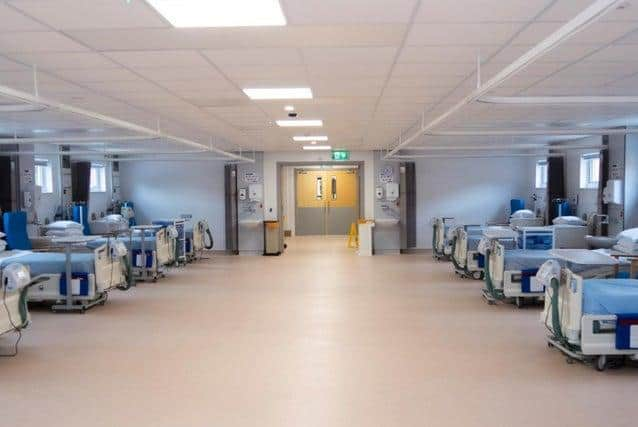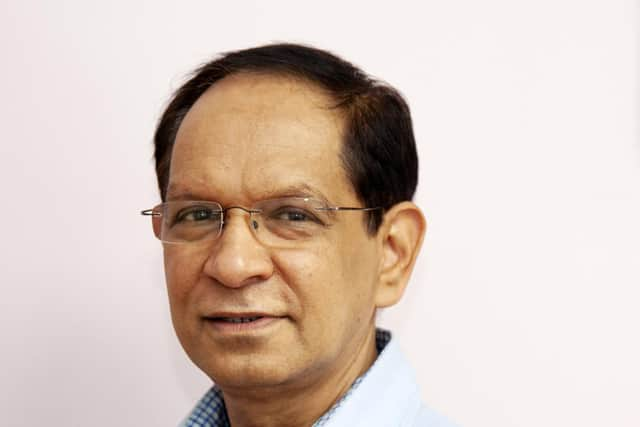'Fear of the unknown' was Wigan NHS Trust's biggest challenge when coronavirus hit, says top doctor
and live on Freeview channel 276
That is according to Dr Sanjay Arya, WWL’s (Wrightington, Wigan and Leigh) medical director who has been overseeing the borough’s response to the virus since March.
Covid-19 had been spreading across the world too fast for any country to handle, and its deadliness was becoming apparent to every health service that the pandemic had taken by surprise. In Italy, there were stark images of entire wards lined with coffins.
Advertisement
Hide AdAdvertisement
Hide AdWWL was determined not to let that happen in Wigan. When the virus began spreading across the UK, Royal Albert Edward Infirmary (more commonly called Wigan Infirmary) underwent a radical transformation.


The entire building was turned into a Covid-19 centre, and an emergency new critical care ward was built in the car park.
It was a battle plan, the likes of which no hospital leaders or staff could ever have trained for. But they quickly adapted to the new operations, which have gradually seen the number of deaths from coronavirus come down. Now, there are often days at a time without a single fatality.
Cautiously, non-coronavirus procedures are being resumed at the Infirmary, such as life, limb and sight-saving operations.
Advertisement
Hide AdAdvertisement
Hide AdBut staff are still alert to the threat of a second wave and, whenever it comes, they are confident that their experiences of fighting the virus so far will prevent far more deaths.


Today, Dr Arya spoke about how NHS staff, the public and the hospital’s leaders had all played their part in helping the Trust cope at the peak of the virus, and how it would handle the potential second surge.
“I think the biggest challenge was the fear of the unknown,” said Dr Arya, a consultant cardiologist.
“We had heard that Covid-19 was a very deadly virus. We had heard, and seen, the huge numbers of deaths which were happening around the world, and the huge number of patients who needed to be hospitalised and needed ventilation, and critical care beds.
Advertisement
Hide AdAdvertisement
Hide Ad“Preparing the hospital for this pandemic was the biggest challenge, especially because we are the biggest borough in Greater Manchester, and given that we have the fastest ageing population and are one of the more deprived areas of Greater Manchester. So keeping all these things in mind, and all that we had seen, preparing the organisation so well was a big challenge.”
He added: “I am so relieved that we prepared ourselves very well, and that we have managed to brave this pandemic.
“We are coping a lot better than we were before. The number of cases of Covid-19 has gradually come down, and the number of people with other serious illnesses is gradually going up. That is because people are now seeking help, which I feel very reassured about. The vast majority of these patients can be treated quickly and make a full recovery.
“There may have been some patients who feel otherwise, but we have never faced this situation before. If anybody feels they were not looked after, I want to offer my sincere apologies.”
Advertisement
Hide AdAdvertisement
Hide AdDr Arya took time to thank WWL’s chief executive Silas Nicholls, chairman Robert Armstrong, all NHS staff and the general public.
Without their concerted effort to protect the NHS, the number of deaths in the borough would have been far higher, said Dr Arya.
Wigan Infirmary has also managed a healthy A&E performance throughout the pandemic, with around 95% of patients being seen within the four hour target.
Dr Arya said this was thanks to the public exercising vigilance and only going to hospital if they require urgent medical treatment.
Advertisement
Hide AdAdvertisement
Hide AdStaff, patients and visitors have also supported the Trust’s new face mask policy, which was introduced this week and requires everyone on site to wear a face covering, to minimise cross infection.
Dr Arya went on: “We are well prepared for a second surge, and we are going to rehearse what we did for the first phase - in terms of critical care beds, in terms of advanced airway support and in terms of the medical wards.
“The first time it worked very well and that will remain the case. We will be able to provide the same preparation and care.
“So on one hand, we are cautiously bringing back life, limb, sight and hearing procedures, but on the other hand we are making sure that if there is a second surge, it is handled with the same efficiency as it was the first time. We are very well prepared.
Advertisement
Hide AdAdvertisement
Hide Ad“We hope a second surge is not as bad, and does not take as many lives as the first. The ways we can avoid a bigger, second wave is by social distancing, maintaining hand hygiene, wearing face masks, and only going out when it is absolutely necessary. That will reduce the rate of a second surge in my medical opinion.”